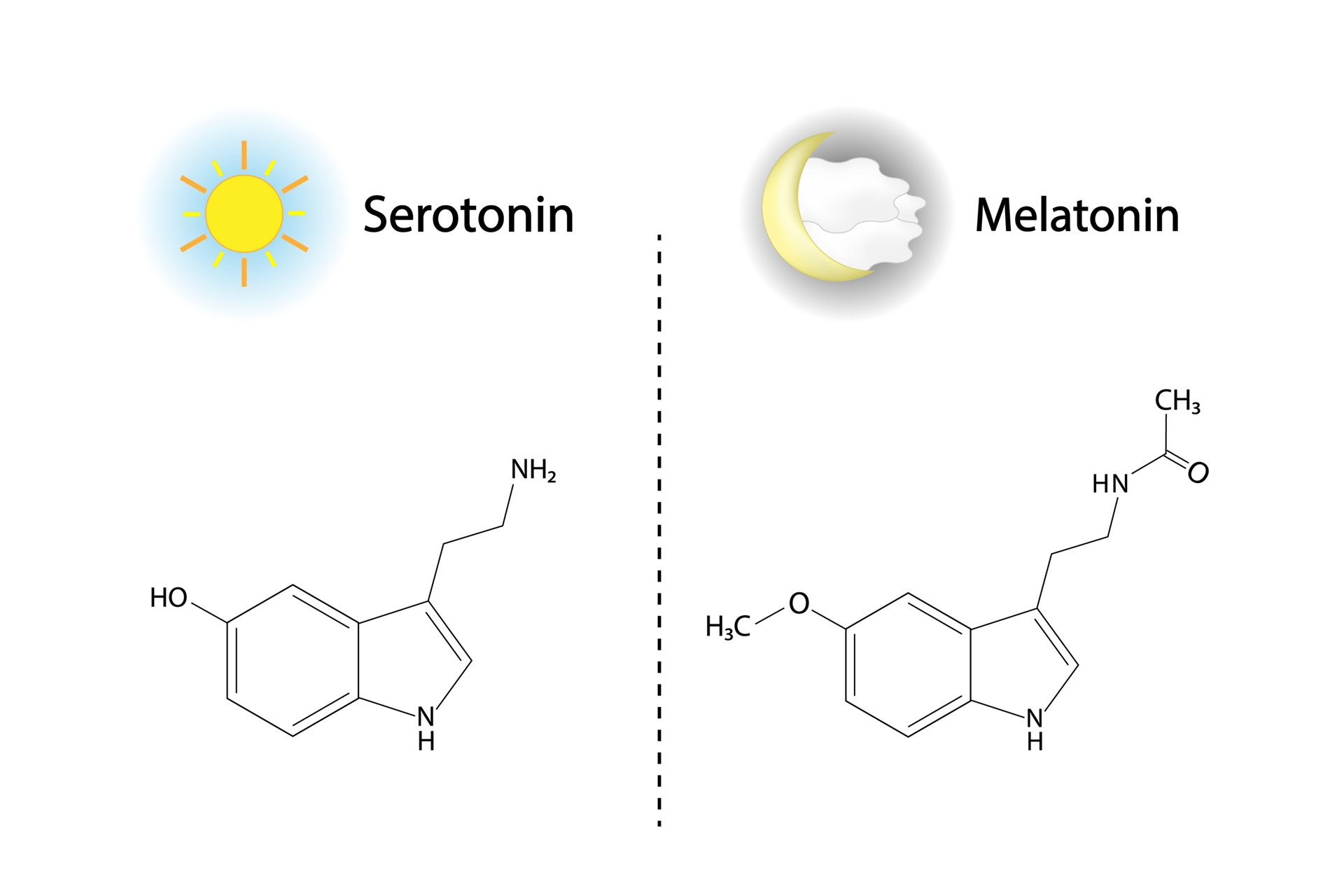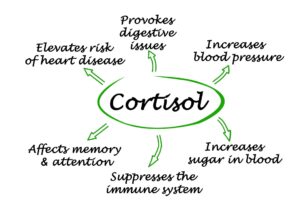
Part 1
Serotonin and melatonin are a neurotransmitter and a hormone that are very misunderstood. Most will see this title and think, “This is not important. It doesn’t apply to me.” If you eat food, then this information applies to you. Both serotonin and melatonin are commonly viewed in a positive nature when talking about health. Serotonin recognized for being the “happy hormone” and melatonin as a sleep aid.
Calling serotonin the “Happy Hormone” in itself talks to the confusion about what is actually a neurotransmitter. Research on serotonin is relatively new and the research that does exist has doubt included. Serotonin and melatonin are not typical conversation topics the average person has around the supper table but they do play an vital role in your health .
The most popular association with serotonin is the antidepressant drugs that are selective serotonin reuptake inhibitors. These are better known as SSRI medication. It may come as a big surprise (it did for me) that there isn’t a single study to support low levels of serotonin and mental disorders.
The fact that these are so widely prescribed under a false theory should at the very least raise questions. I’m not suggesting anyone to stop antidepressants. That would be socially irresponsible on my part. However, I do suggest digging a little deeper for yourself and understanding how the body functions. Once you have enough reference points you can smell the bullS#!t from across the room.
David Healey, a professor of psychiatry said,” No one knew if SSRIs raised or lowered serotonin levels; they still don’t know. There was no evidence that treatment corrected anything.” Safe to say his article in the British Medical Journal turned some heads.
Serotonin
Cultural belief can be a powerful mental mask in creating tunnel vision. Hearing something repeated over and over provides sustaining power and eventually a dogma gets created.
When serotonin is in excess, it can be excitatory to the cells. This leads to cell death and can suppress the production of dopamine leading to things like depression, anxiety, and aggression. Serotonin shouldn’t be associated with well being, especially when it’s being overly produced.
Keep in mind that 95% of our serotonin is produced in the intestines with a small fraction of that being produced by the brain. A portion is converted from tryptophan, from our diet into serotonin. Serotonin is carried in the blood stream and should ideally be detoxified in the lungs. Inflammation comes from over exposure to the lining of the circulatory system.
Tryptophan, an amino acid is a precursor to serotonin. Some of the foods with higher tryptophan are nuts, seeds, soybeans, beef, lamb, turkey, chicken, tuna, whole grains, beans, lentils, and some cheeses. I know you just read that list and said WTF?! This could explain why certain people have reactions to these foods such as digestion issues or migraines. Finding the reason why can be frustrating and futile. I’ll discuss later how to mitigate this.
For those people that have intestinal disease, like inflammatory bowel diseases, tumors or cancers, their intestines convert 60% of the tryptophan into serotonin.
Looking at the physiology of serotonin and its adverse ill effects comes down to its effect on mitochondrial energy production or energy of the cell. In other words, the cells in the body produce enough energy to function properly. You could argue mitochondrial energy production is the crux of all diseases.
So basically, serotonin inhibits the production of cellular energy. Through this inhibition serotonin inhibits the uptake or the utilization of oxygen into the cells. This leads to the deprivation of oxygen, which is a major source of energy in the metabolism and therefore the inflammation associated.
Having excess serotonin can result in a vicious cycle. With anything that generally causes stress and increases stress hormones like adrenaline and cortisol, will also increase the production of serotonin.
In essence, to reduce total serotonin production, we also want to reduce our total stress hormone production. Anything that’s going to reduce the production of adrenaline, cortisol, and other stress hormones is going to be helpful for preventing the excess production of serotonin.
Serotonin and Melatonin
Signs of High Serotonin
- Loose bowels
- Irritable bowel syndrome (IBS) Anti serotonin drugs help this condition
- Excessive sweating
- Depression
- Irritability
- Aggression
- Insomnia
- Migraines
- Impaired learning
- Fibrosis
- Neurological damage
What will Increase Serotonin?
- Hypothyroidism
- Starches and fibers. Hard to digest foods will sit longer and feed bacteria longer
- Food additives such as pectin, guar gums, carrageenan
- High tryptophan foods
- Starchy fruits (bananas, apples, pears)
- Estrogen
- Excessive water intake
- Under eating. Every cells need energy
- Polyunsaturated fats (cheap oils like canola, Mazola, soybean etc.)
- Whey protein (high tryptophan which promotes serotonin)
- Hyperventilation – lowers carbon dioxide levels and this causes blood to dump serotonin and inflame the intestines.
How to lower Serotonin
- Optimal thyroid functioning. Thyroid impacts every cell in the body
- Avoiding foods that irritate the stomach
- Vitamin B6. This vitamin will convert tryptophan to niacinamide
- Cyproheptadine. Commonly used to treat serotonin syndrome.
- Caffeine. This supplies energy as long as there is enough calories to run the ‘engine.’
- Raw carrots. act like an antiseptic.
- Activated charcoal. Similar to raw carrots and cooked bamboo shoots which help lowers endotoxins
- Herbs. Herbs such as Mucuna and Gingko Bilboa have some positive effects.
- Matcha Tea. The caffeine will increase dopamine which is anti-serotonin.
- Taurine. An amino acid that has anti-excitatory and anti-inflammatory effects.
- Glycine. An abundant amino acid in a gelatin powder or beef broths and stocks.
- Enough protein daily (100 grams or more) to support the liver.
- Co2. Living at a high altitude is beneficial and bag breathing will help too.
LSD. “In animal studies LSD, and other anti-serotonin agents, increase playfulness and accelerate learning, and cause behavioral impairment only at very high doses. While reserpine was used medically for several decades, and was eventually found to have harmful side effects, medical research in LSD was stopped before its actual side effects could be discovered. The misrepresentations about LSD, as a powerful anti-serotonin agent, allowed a set of cultural stereotypes about serotonin to be established. Misconceptions about serotonin and melatonin and tryptophan, which are metabolically interrelated, have persisted, and it seems that the drug industry has exploited these mistakes to promote the “new generation” of psychoactive drugs as activators of serotonin responses. If LSD makes people go berserk, as the government claimed, then a product to amplify the effects of serotonin should make people sane.” – Ray Peat
Even though Hans Seyle showed in 1965 that an injection of serotonin could cause muscular dystrophy, there is still minimal research and misunderstanding in this area.
In animal studies anti-serotonin drugs increase playfulness and accelerate learning. Impairments in behavior are only seen at high levels.
It does appear similar to estrogen in the stress response and in how it affects women more than men.
If you view serotonin as as suppressor of cellular energy then the detriments become clearer. If a cell’s energy is impaired, its function is impaired.
Not everyone is receptive to information that contradicts their reality. I do know many of you reading will read the articles below and do your own research if further is needed.
I’ll continue next week with part 2 and information regarding melatonin.
The True Method of Knowledge is Experiment – William Blake
Further reading on Serotonin:
Serotonin, Depression and Aggression
Serotonin: Effects is Disease and Aging
Tryptophan, Serotonin and Aging
Serotonin and Melatonin; Very Misunderstood
Part 2
Melatonin is a common sleep remedy that can be found in almost any pharmacy or grocery store. Facebook groups, websites, and doctors have characterized this hormone with nearly unlimited abilities. They contend it acts as a sleep aid, an anti-oxidant, anti-aging, and even prescribed for fighting cancer. However, is the science strong enough to trust in adding a hormone to your body without knowing how it works?
Melatonin was first isolated in 1958 from a brain region called the pineal gland. It was found to play a major role in the body’s circadian rhythms. It promotes sleep as levels climb in response from the day light and then the darkness of night. Amounts fall during the day, and levels will also vary from a low in the summer to highest in the winter.
I’m not picking on any brands here but most store bought brands usually pack a whopping 3mg – 5mg as there only option. The 3mg dose pills are at least 5-6X what the body would naturally produce. Melatonin can be mildly sedating, but its real appeal is in helping establish the circadian rhythm. People with jet lag or shift work can take a small dose before bedtime to reestablish a better sleep cycle based on their present time zone. However, it’s not the time zone your body is accustomed to. For short term use in adults, Melatonin does seem to be tolerated better than other sleep medications.
Most studies show a small amount of side effects including sedation, lightheadedness, or nausea. These are minor compared to the dry mouth, urinary retention, mental fog and drowsiness caused by most other over the counter sleep aids.
Unfortunately, melatonin is increasingly being utilized as a sleep aid for children. Doses as high as 10mg are recommended by professionals which is far higher than any natural amount the body would produce. It’s important to understand that there is more to melatonin than sleep promoting abilities. Melatonin, is a hormone and is part of a complex fertility and puberty signaling cycle in the body.
In many mammals, high melatonin levels suppress fertility in the winter, and when levels drop, the springtime fertility cycle begins. Melatonin was even investigated as a contraceptive in the 1990s and is commonly used in certain livestock to control fertility.
While humans don’t experience a winter infertile season, it does make one pause when considering taking large doses every night in an ongoing fashion. Melatonin levels that are good for a chipmunk in winter might not be good for a teen starting puberty.
Young children have higher levels of melatonin than adolescents. This is one of the main reasons teenagers “burn the candle” at both ends but little kids seldom are poor sleepers. A major problem is that we really don’t know what melatonin does in humans around puberty.
Melatonin has been used as a natural fertility suppressant. When used experimentally in women and men it has been shown to improve the embryos viability and the quality of the sperm. Low doses of melatonin can bring on early fertility cycle in sheep. Melatonin’s anti-oxidant properties rather than the hormonal suppressing properties may be in play here. The research strongly suggests that melatonin can be an important and powerful hormone that we don’t fully understand. Low levels may promote fertility in one person and have the opposite affect in another.
Serotonin and Melatonin
Melatonin may be the cats meow for people with stressed out lives, too much artificial light, and crazy sleep cycles but not so great for a kid with an insomnia problem. High and low doses of melatonin have changed puberty onset and not always in the direction you might think. Studies have showed very low dose melatonin (about 100th the amount a child would get from a 3mg dose) in primates advanced puberty by 5 months but delayed puberty in female cats.
Melatonin can be a safe and effective short term treatment for jet lag and shift workers who want to get their sleep rhythms back on track. In general a very low dose (0.5-1 mg, for example), is more than sufficient. Avoiding use in children until there’s more research about the effect on puberty would be prudent.
If you know someone who could benefit from this information feel free to share.
Stay well,
Sean




